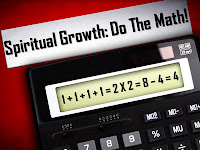 Math Challenged
Math ChallengedIn High School, Math was my worst subject. When I got to college I continued to struggle with math. It wasn’t that I couldn’t figure out the formulas and equations. I could do it. I just hated it. It made my brain hurt. In those first years of college, I had to learn that getting on in life meant doing some things I didn’t enjoy--even math. But, whether I liked it or not, one course of college algebra was required for my degree. The only problem was that I had done so poorly in High School that I had to take a refresher course as a prerequisite for the college level algebra class. Then, my advisor recommended that I take the class over two semesters—the course was broken down into algebra A and algebra B for math challenged students like me. With a lot of help from my wife, a math genius when compared to me, I finally got through college algebra. So, I managed to graduate with a bachelor’s degree and go on to earn a master’s degree without taking any other math courses than college algebra. At the present, I’m completing a doctoral degree. Yet again, I’m faced with math. And not just any math, but the worst possible kind of math: Statistics!
God & Math
As much as I generally loathe math, I am in awe and wonder at the mathematical precision of God’s creation. The universe is an amazing set of mathematical equations that demonstrate the majesty and power of our God (See Romans 1:20).
As much as I generally loathe math, I am in awe and wonder at the mathematical precision of God’s creation. The universe is an amazing set of mathematical equations that demonstrate the majesty and power of our God (See Romans 1:20).
Spiritual Growth & Math
Beyond the mathematical grandeur of God’s creation, I believe another aspect of mathematics well illustrates the nature of spiritual growth. The pedagogy of mathematics is comprehensive. In other words, we learn mathematical principles and their application through a building-block process. We must first learn to count before we may learn to add or subtract. We must learn to add and subtract before we may learn to multiply or divide—and so on.
Beyond the mathematical grandeur of God’s creation, I believe another aspect of mathematics well illustrates the nature of spiritual growth. The pedagogy of mathematics is comprehensive. In other words, we learn mathematical principles and their application through a building-block process. We must first learn to count before we may learn to add or subtract. We must learn to add and subtract before we may learn to multiply or divide—and so on.
Growing in the Spiritual life is like mathematical pedagogy in this way—it is comprehensive. There are building blocks that build one upon another as we grow spiritually in our walk with the Lord. But unlike learning math, a process that need only engage the mind, spiritual growth (perhaps, better conceptualized as spiritual formation) engages the whole person: mind, body and spirit.
Suggested Scriptures for prayer and study: Hebrews 5:12-14; 2 Peter 1:5-11, 3:18
A Question
The next several blog posts will explore the significant building blocks that are part of the spiritual growth process. For now, I want to pose a question: How is it that followers of Jesus who struggle with the spiritual equivalent of adding and subtracting tend to attempt the spiritual equivalent of calculus or trigonometry only to fail time and time again? What are your thoughts?
The next several blog posts will explore the significant building blocks that are part of the spiritual growth process. For now, I want to pose a question: How is it that followers of Jesus who struggle with the spiritual equivalent of adding and subtracting tend to attempt the spiritual equivalent of calculus or trigonometry only to fail time and time again? What are your thoughts?
I think you may have found the next class(es) to teach. Christianity 101, 102, 103. For people who don't really understand the Bible, a general class with basic fundamentals would be great. Simple things like summarizing the different books, chapters, and authors of the Bible and their importance. Understanding basic concepts, vocabulary, geography, time periods, and what the books are trying to get across to the reader would be Christianity 101. It would also give Christians a basic understanding of what the Bible is, before reading it. You wouldn’t read each book of the Bible as part of this class; you would almost outline the Bible together. Christianity 102 and 103 could dive deeper into Bible using a comprehensive approach. Once the person understands the basics of the Bible, Books, Chapters, etc., you can learn/grow as a Christian with a strong fundamental foundation and confidence. Because like you, until the math student understands the equations and formulas in math class, he or she will not be able to complete advanced trigonometry. A Christian student will not understand the Bible to its fullest without knowing the basic fundamentals of the Bible.
ReplyDelete